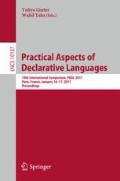Abstract
In applied game theory the modelling of each player’s intentions and motivations is a key aspect. In classical game theory these are encoded in the payoff functions. In previous work [2, 4] a novel way of modelling games was introduced where players and their goals are more naturally described by a special class of higher-order functions called quantifiers. We refer to these as higher-order games. Such games can be directly and naturally implemented in strongly typed functional programming languages such as Haskell [3]. In this paper we introduce a new solution concept for such higher-order games, which we call selection equilibrium. The original notion proposed in [4] is now called quantifier equilibrium. We show that for a special class of games these two notions coincide, but that in general, the notion of selection equilibrium seems to be the right notion to consider, as illustrated through variants of coordination games where agents are modelled via fixed-point operators. This paper is accompanied by a Haskell implementation of all the definitions and examples.
Access this chapter
Tax calculation will be finalised at checkout
Purchases are for personal use only
Notes
- 1.
- 2.
As long as our games are finite we can easily replace powersets with lists, which we do in the accompanying implementation.
- 3.
The terminology comes from the observation that the usual existential \(\exists \) and universal \(\forall \) quantifiers of logic can be seen as operations of type \((X \rightarrow \mathbb {B}) \rightarrow \mathbb {B}\), where \(\mathbb {B}\) is the type of booleans. Mostowski [12] also called arbitrary functionals of type \((X \rightarrow \mathbb {B}) \rightarrow \mathbb {B}\) generalised quantifiers. We are choosing to generalise this further by replacing the booleans \(\mathbb {B}\) with an arbitrary type R, and allowing for the operation to be multi-valued.
- 4.
- 5.
In the following we will assume that quantifiers and selection functions are non-empty. That is, agents will always have a preferred outcome, respectively move, in all situations they have to make a decision. See [9] for a discussion.
- 6.
The economist John Maynard Keynes [11] remarked that investors in financial markets can be described as not being interested in the outcome per se but that they want to behave in line with the majority (in order to “buy low and sell high”). This behaviour can be elegantly captured as fixed point goals.
- 7.
Note that we might have a strict inclusion \(\varepsilon (p) \subset \overline{\overline{\varepsilon }}(p)\) in case we have \(x_1 \ne x_2\), with \(x_1 \in \varepsilon (p)\) and \(x_2 \not \in \varepsilon (p)\) but \(p(x_1) = p(x_2)\).
References
Botta, N., Ionescu, C., Brady, E.: Sequential decision problems, dependently typed solutions. In: Proceedings of PLMMS 2013 (2013)
Escardó, M., Oliva, P.: Selection functions, bar recursion and backward induction. Math. Struct. Comput. Sci. 20(2), 127–168 (2010)
Escardó, M., Oliva, P.: What sequential games, the Tychonoff theorem and the double-negation shift have in common. In: Proceedings of the Third ACM SIGPLAN Workshop on Mathematically Structured Functional Programming (MSFP 2010), pp. 21–32 (2010)
Escardó, M., Oliva, P.: Sequential games and optimal strategies. Proc. R. Soc. Lond. A Math. Phys. Eng. Sci. 467(2130), 1519–1545 (2011)
Ghani, N., Hedges, J.: A compositional approach to economic game theory. arXiv:1603.04641 (2016)
Hedges, J.: A generalization of Nash’s theorem with higher-order functionals. Proc. R. Soc. Lond. A Math. Phys. Eng. Sci. 469(2154) (2013). http://rspa.royalsocietypublishing.org/content/469/2154/20130041
Hedges, J.: Monad transformers for backtracking search. In: Proceedings of the 5th Workshop on Mathematically Structured Functional Programming, pp. 31–50. Open Publishing Association (2014)
Hedges, J.: Towards compositional game theory. Ph.D. thesis, Queen Mary University of London (2016)
Hedges, J., Oliva, P., Sprits, E., Winschel, V., Zahn, P.: Higher-order decision theory. arXiv preprint cs.GT, arXiv:1506.01003 (2015)
Hedges, J., Sprits, E., Winschel, V., Zahn, P.: Compositionality and string diagrams for game theory. arXiv:1604.06061 (2015)
Keynes, J.M.: General Theory of Employment, Interest and Money. Macmillan, London (1936)
Mostowski, A.: On a generalization of quantifiers. Fundamenta Mathematicae 44, 12–36 (1957)
Osborne, M., Rubinstein, A.: Course in Game Theory. MIT Press, Cambridge (1994)
Author information
Authors and Affiliations
Corresponding author
Editor information
Editors and Affiliations
Rights and permissions
Copyright information
© 2017 Springer International Publishing AG
About this paper
Cite this paper
Hedges, J., Oliva, P., Shprits, E., Winschel, V., Zahn, P. (2017). Selection Equilibria of Higher-Order Games. In: Lierler, Y., Taha, W. (eds) Practical Aspects of Declarative Languages. PADL 2017. Lecture Notes in Computer Science(), vol 10137. Springer, Cham. https://doi.org/10.1007/978-3-319-51676-9_9
Download citation
DOI: https://doi.org/10.1007/978-3-319-51676-9_9
Published:
Publisher Name: Springer, Cham
Print ISBN: 978-3-319-51675-2
Online ISBN: 978-3-319-51676-9
eBook Packages: Computer ScienceComputer Science (R0)

